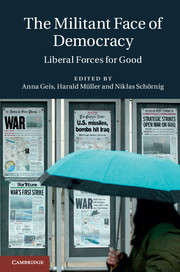Crossref Citations
This Book has been
cited by the following publications. This list is generated based on data provided by Crossref.
Fischer, Karsten
2014.
Deliberative Kritik - Kritik der Deliberation.
p.
103.
Pfeifer, Hanna
2014.
Politische Narrative.
p.
259.
Müller, Harald
and
Wolff, Jonas
2014.
The Dual Use of an Historical Event: ‘Rwanda 1994’, the Justification and Critique of Liberal Interventionism.
Journal of Intervention and Statebuilding,
Vol. 8,
Issue. 4,
p.
280.
Müller, Harald
2014.
Evilization in liberal discourse: From Kant’s ‘unjust enemy’ to today’s ‘rogue state’.
International Politics,
Vol. 51,
Issue. 4,
p.
475.
Geis, Anna
and
Wunderlich, Carmen
2014.
The good, the bad, and the ugly: Comparing the notions of ‘rogue’ and ‘evil’ in international politics.
International Politics,
Vol. 51,
Issue. 4,
p.
458.
Harnisch, Sebastian
2015.
Handbuch Policy-Forschung.
p.
723.
Karagiannis, Emmanuel
2016.
Ukrainian volunteer fighters in the eastern front: ideas, political-social norms and emotions as mobilization mechanisms.
Southeast European and Black Sea Studies,
Vol. 16,
Issue. 1,
p.
139.
Reder, Michael
and
Pfeifer, Hanna
2017.
Handbuch Friedensethik.
p.
651.
Onderco, Michal
and
Wagner, Wolfgang
2017.
The ideational foundations of coercion: political culture and policies towards North Korea.
European Political Science Review,
Vol. 9,
Issue. 2,
p.
279.
Wagner, Wolfgang
2017.
Liberal Power Europe.
JCMS: Journal of Common Market Studies,
Vol. 55,
Issue. 6,
p.
1398.
Palm, Trineke
2017.
The changing character of EUFOR Althea: power politics or learning?.
Cambridge Review of International Affairs,
Vol. 30,
Issue. 1,
p.
67.
Wagner, Wolfgang
Herranz-Surrallés, Anna
Kaarbo, Juliet
and
Ostermann, Falk
2017.
The party politics of legislative‒executive relations in security and defence policy.
West European Politics,
Vol. 40,
Issue. 1,
p.
20.
Dembinski, Matthias
2017.
Handbuch Friedensethik.
p.
703.
Geis
and
Schlag
2017.
‘The facts cannot be denied’: legitimacy, war and the use of chemical weapons in Syria.
Global Discourse,
Vol. 7,
Issue. 2,
p.
285.
Hobson, Christopher
2017.
Democratic Peace: Progress and Crisis.
Perspectives on Politics,
Vol. 15,
Issue. 3,
p.
697.
Müller, Harald
2018.
Ordnung und Regieren in der Weltgesellschaft.
p.
103.
Brock, Lothar
2019.
Handbuch Frieden.
p.
301.
Heck, Axel
2019.
Democratic distinctiveness, responsibility, and the politics of ethics in justifications of war.
Critical Studies on Security,
Vol. 7,
Issue. 3,
p.
243.
Mello, Patrick A.
2019.
National restrictions in multinational military operations: A conceptual framework.
Contemporary Security Policy,
Vol. 40,
Issue. 1,
p.
38.
MOE, LOUISE WIUFF
and
GEIS, ANNA
2020.
From liberal interventionism to stabilisation: A new consensus on norm-downsizing in interventions in Africa.
Global Constitutionalism,
Vol. 9,
Issue. 2,
p.
387.





